Inside The Electric Vehicle (EV) Industry In Malaysia
Electric vehicles in Malaysia are becoming increasingly popular due to their efficiency, convenience, and cost savings compared to gasoline-powered cars. In recent years, the Malaysian government has been actively promoting electric vehicles and developing the necessary infrastructure to support them, such as charging stations.
In our latest Consumer Report Malaysia 2023, we surveyed over 1,000 Malaysians to uncover their opinions and preferences on a multitude of topics including electric vehicles in Malaysia. The insights we’ve gathered offer brand managers and marketers promising avenues to promote their products and services within the expanding and potentially lucrative market for electric vehicles in Malaysia. Continue reading to explore the findings from our study.
Malaysia Electric Vehicle Market Overview
According to Statista, electric cars in Malaysia are regarded as an up-and-coming market, as revenue is expected to reach US$115.30m in 2023 and grow at an annual rate of 24.15% CAGR by 2027 – generating a projected market volume of US$273.90m. EV unit sales are expected to increase from 1,472 in 2019 to 5,674.7 units by 2027.
In terms of international perspectives, most revenue will be generated from electric vehicle markets in China, with a forecasted amount approximating US$190,400 million for the year 2023. With such potential growth and projected market size, automotive electric vehicles in Malaysia present a promising opportunity within the country and abroad.
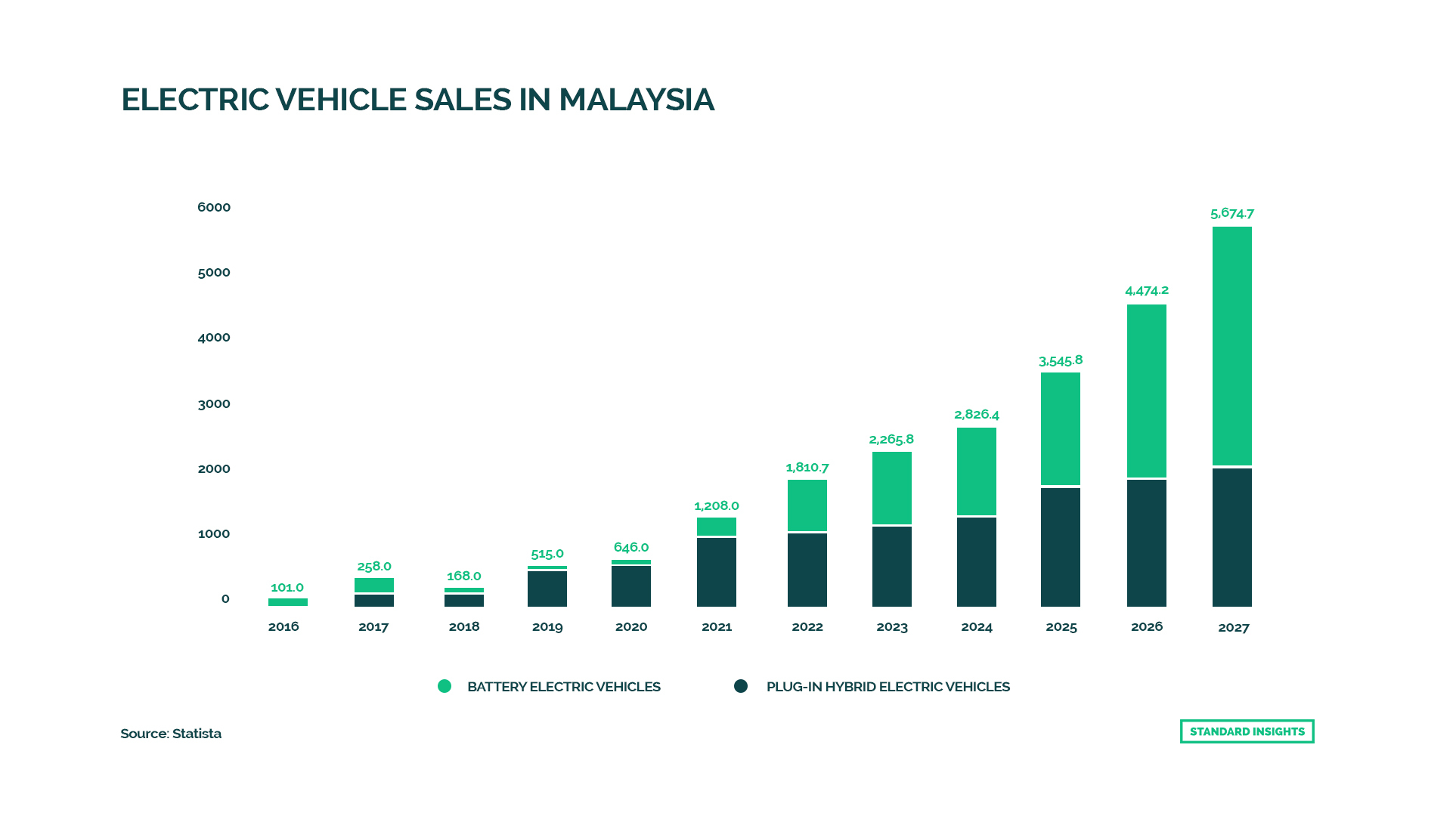
How many EV brands are there in Malaysia?
The market for electric vehicles in Malaysia offers a variety of brands and models catering to different price ranges and preferences. Among the most popular EV car brands for new car buyers are Mercedes-Benz, BMW, Volvo, and Nissan. BMW has been a front-runner in electrifying the Malaysian automotive market with recent introductions like the iX and iX3, and it’s planning to add the i4 to its lineup soon
For those looking for more budget-friendly options, the Neta V is noted as the cheapest EV car available in Malaysia, priced at RM 99,800. On the other hand, the Hyundai Kona Electric represents the most cost-effective choice for those wanting to experience an electric vehicle, with the base model being particularly affordable.
For the high-end segment, the most expensive electric vehicle available is the Rolls Royce Spectre, priced at RM 2,000,000. This diverse range of options demonstrates Malaysia’s growing EV market and the increasing availability of electric vehicles to suit a wide array of consumers.
5 Factors Driving Electric Vehicle Adoption in Malaysia
1. Environmental Awareness Among Malaysian Citizens
One of the main drivers of the adoption of electric vehicles in Malaysia has been the growing environmental awareness among citizens. As a result of regularly conducting Market Research in Malaysia, we have found that Malaysians are becoming increasingly conscious about reducing their carbon footprint and emissions, and EVs offer them a way to do so. This is compounded by government initiatives such as subsidies on electric vehicles, tax exemptions, and other incentives that make EVs more attractive to buyers.
According to our study, 85.4% of Malaysians believe that their actions toward the environment will significantly influence the planet’s improvement or destruction. This data is uniform across all filters.
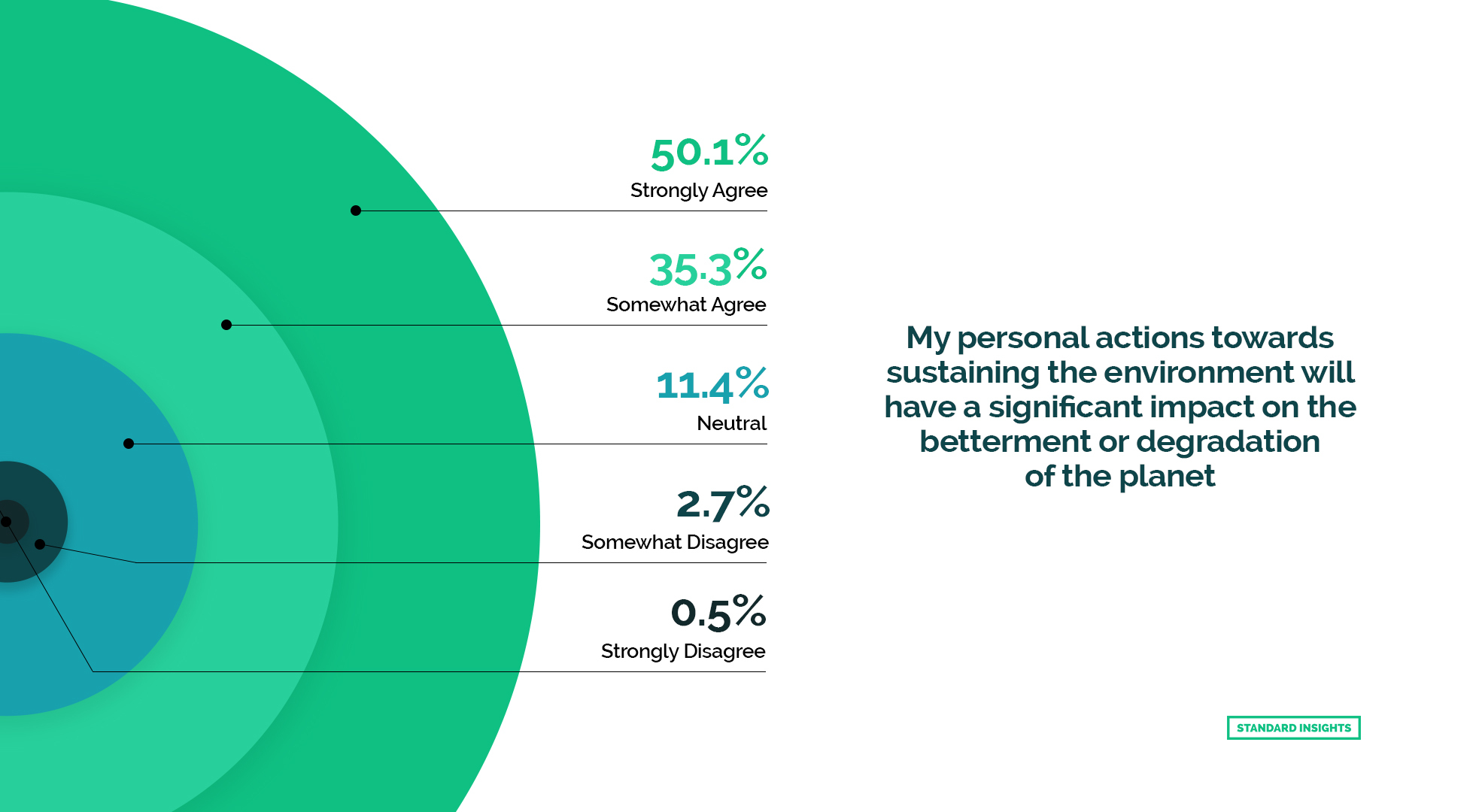
2. Availability of Charging Infrastructure
The second factor driving electric vehicle adoption in Malaysia is the availability of charging infrastructure. Electric vehicle drivers in the country demand battery capacity charging infrastructure that can quickly replenish their vehicle’s battery, so the Malaysian government has invested heavily in developing an extensive network of charging points across the country, with over 500 public charging stations currently in operation. This infrastructure is critical for encouraging EV adoption, as it gives drivers peace of mind knowing they can charge their vehicles when needed.
3. Tax Breaks and Subsidies Provided by Government
The Malaysian government has been actively promoting electric vehicles in Malaysia through incentives, such as tax breaks and subsidies, and providing access to public funding. This is being done to reduce the country’s dependence on oil and gas, which currently accounts for around two-thirds of its energy consumption.
The cost of electric vehicles in Malaysia is also becoming more competitive due to declining battery costs, increasing efficiency, improved technology, and cheaper renewable energy sources. As a result, the current market price of electric vehicles in Malaysia is now lower than traditional cars in some parts of the country. Furthermore, the reduced running costs associated with electric vehicles mean that consumers can save money over time on fuel and maintenance costs.
4. Companies’ Proactivity in Addressing Environmental Impact
In the same study, we uncovered that most Malaysians (94.9%) agree that companies/brands should be transparent and proactive in addressing environmental and social issues. Notably, only a tiny proportion of the respondents disagree with this statement (0.4%).
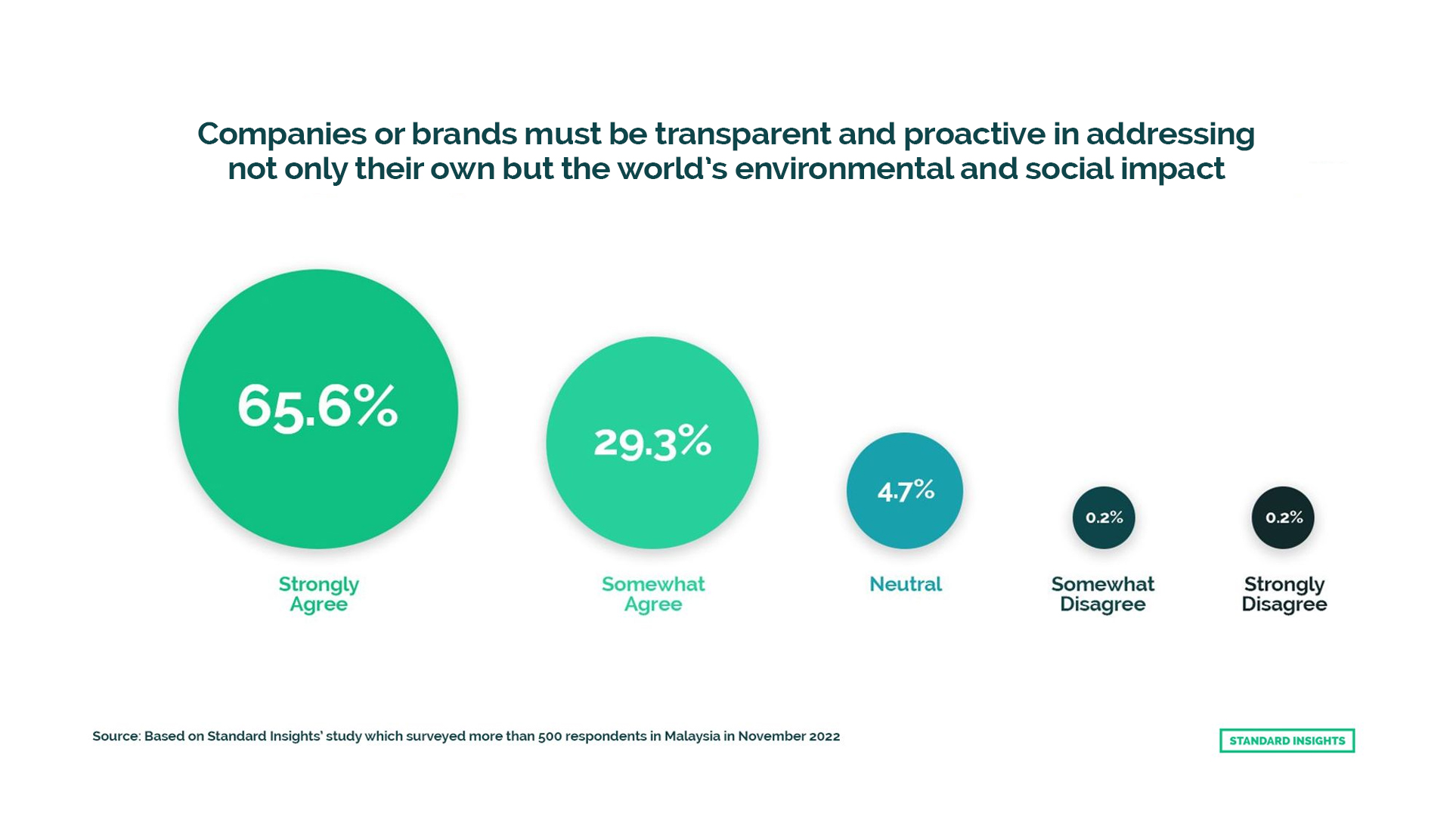
Several companies have even begun offering innovative services designed to make it easier for people in Malaysia to switch from traditional cars to electric vehicles. Companies such as Ridee offer car-sharing services with an all-electric fleet, while other companies like MyCar provide access to short-term rentals of electric vehicles at affordable prices. Such services make it easier for people who do not own an electric vehicle to hire one as needed rather than purchasing one altogether.
5. Advancements in Battery Technology
Additionally, advancements in battery technology have made EVs more attractive to consumers. Lithium-ion batteries have improved both range and charging time for EVs, making them a viable alternative for long-distance travel without worrying about running out of power or waiting hours for a charge. In addition, many new models now come with enhanced safety features such as multiple airbags and anti-lock brakes, making them even more appealing to buyers looking for reliable transportation options.
Malaysians’ Perception Of Using Electric Vehicles
Electric motorbikes and electric vehicles in Malaysia are gaining more popularity as viable transportation options for many in the country. According to the same study, 36.4% of Malaysians have considered and 24.2% have shown interest in getting an EV or electric motorbike. Specifically, 45.3% of those polled over 45 said they would most likely buy an electric vehicle as their future vehicle.
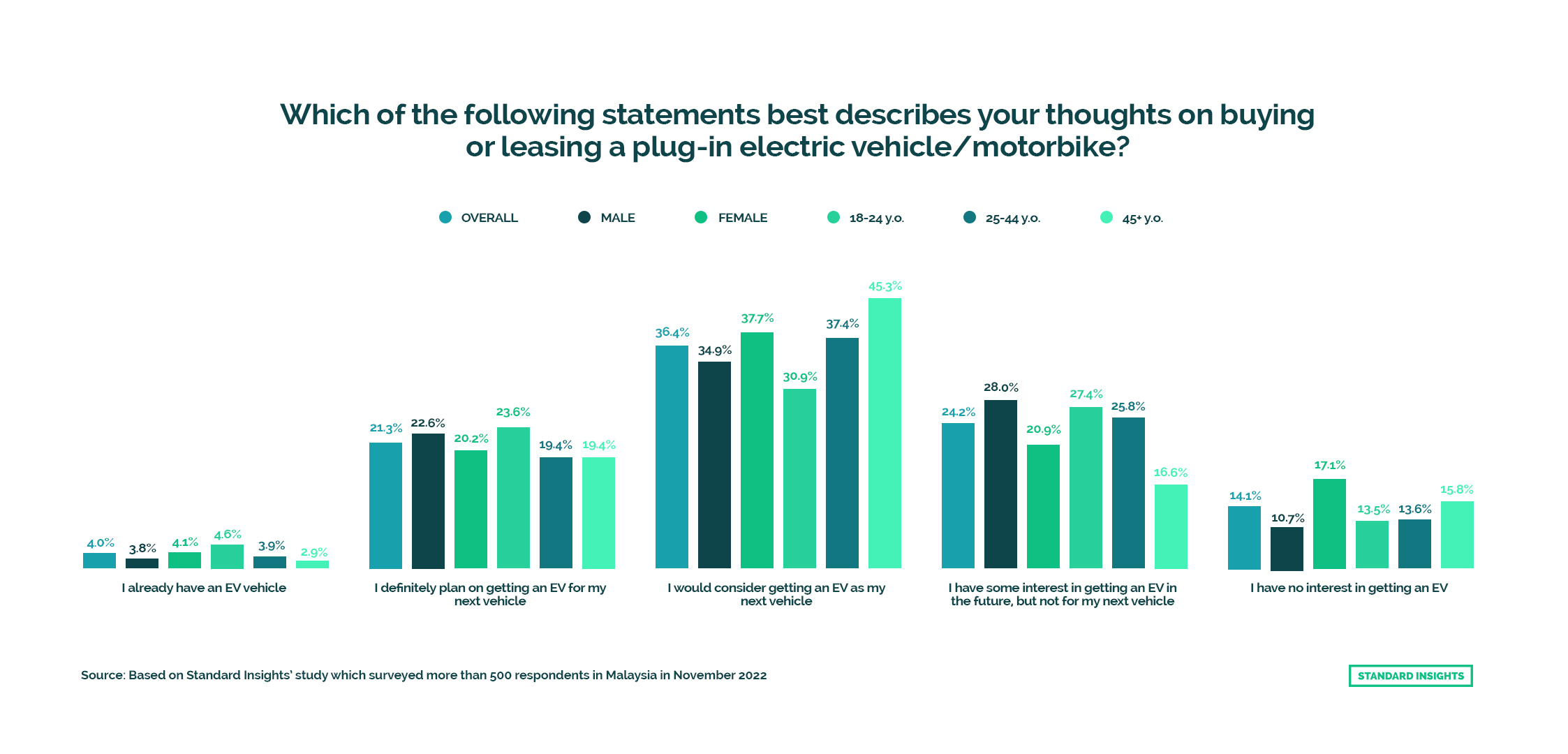
Furthermore, many Malaysians believe that owning an Electric Vehicle (EV) has several advantages. 64.7% of surveyed participants reported that an EV could help them save money on fuel costs, while 62.0% agree that it could reduce environmental impact.
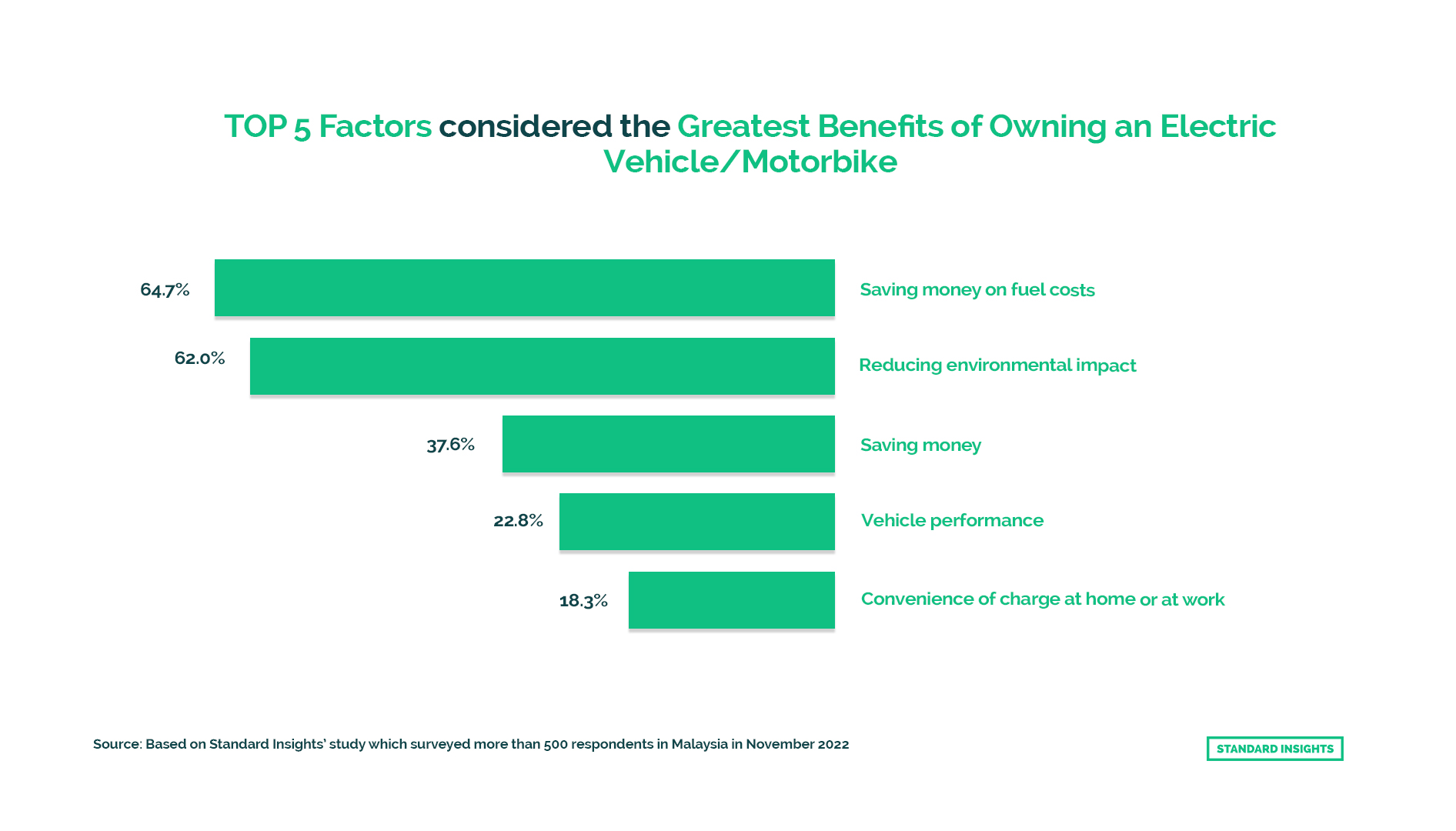
Another major benefit of owning an EV is its significantly lower running costs compared to traditional fossil fuel cars. The initial cost of purchasing an EV may be higher, but the total cost of ownership over time will be much lower due to not having to spend money on petrol or diesel for refueling and oil for maintenance.
In addition, EVs produce zero tailpipe emissions and are significantly quieter than traditional combustion engine vehicles. This makes them ideal for driving in areas with limited air quality or where noise pollution is a problem.
These benefits make owning an EV one of the most practical eco-friendly solutions available today.
However, purchasing an electric vehicle in Malaysia comes with several challenges. In the same study, 60.4% of respondents believe there are insufficient charging stations for electric vehicles. This is a significant issue, as a lack of charging infrastructure can lead to a lack of convenience for users, discouraging potential buyers.
The study also revealed that 55.9% consider the high initial cost the most challenging factor when deciding whether or not to buy an EV. Lastly, battery longevity is also a concern among potential buyers, with 55.15% doubting the long-term dependability of an EV’s battery life span and performance over time.
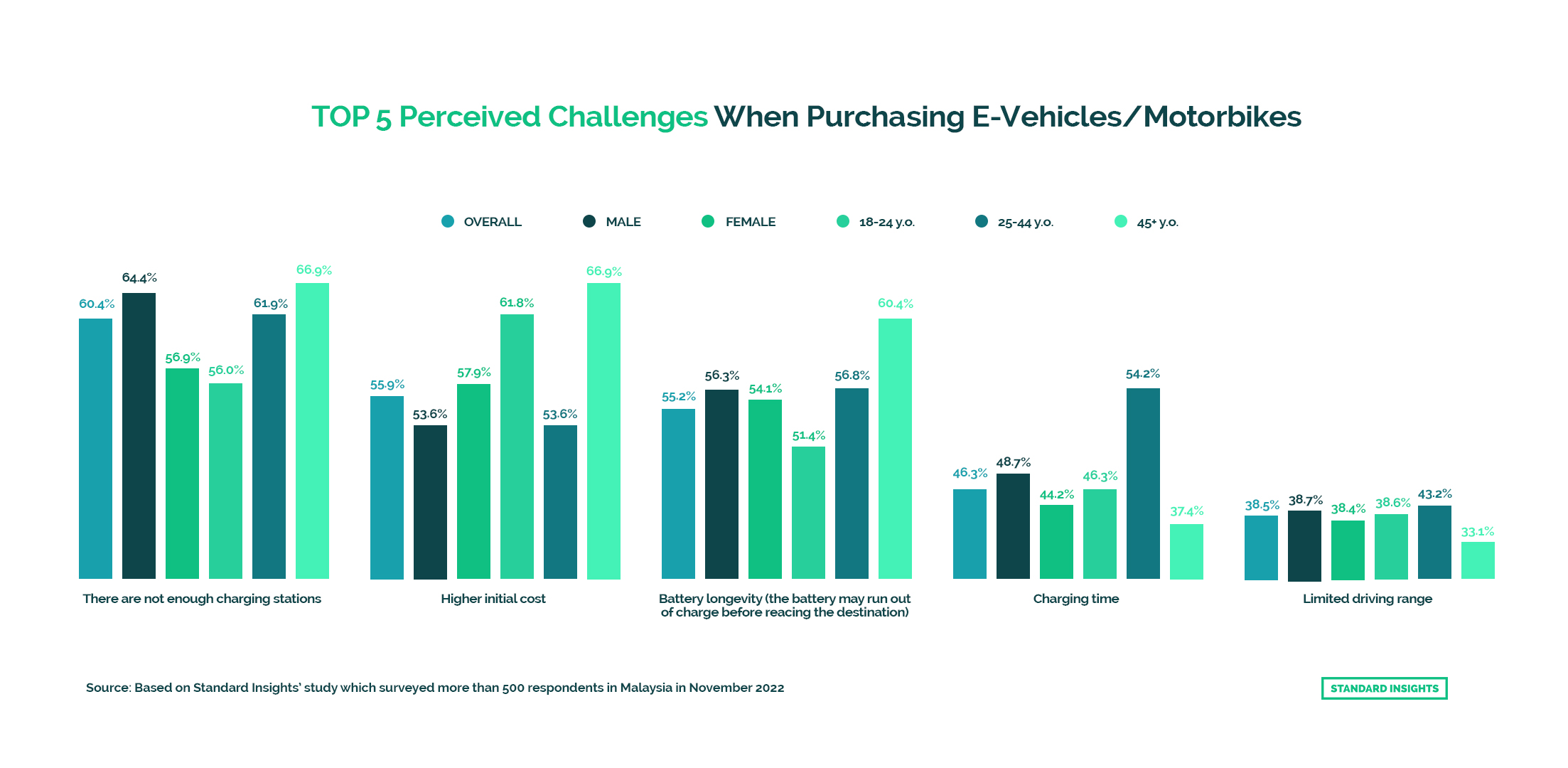
On the other hand, although male respondents (64.4%), those aged 25-44 (61.9%), and those aged 45+ (66.91%) are more concerned about the absence of EV charging stations, female respondents (57.9%) and those aged 18-24 (61.8%) are more concerned about their initial cost.
Local governments must consequently increase charging station accessibility, lower initial prices through incentives and tax breaks, and give credible data on battery longevity so that potential customers may make informed judgments about their options. Only then will Malaysians be able to fully enjoy the numerous benefits of electric vehicles without having to worry about these difficulties.
Increasing Needs for Reliable Charging Infrastructure in Malaysia
Malaysia’s automobile industry employs about 710,000 people and contributes 4% of the country’s GDP, showing that the industry plays a crucial role in the country’s manufacturing sector. While the electric vehicle (EV) sector is still in its early stages, it is well-positioned for growth. Many companies that boost EV production by providing the inputs, such as semiconductors and copper wire manufacturing, already have facilities in Malaysia.
However, Malaysia’s EV infrastructure remains deficient, notably EV charging stations. Malaysia presently has only around 600 EV charging stations, which is insufficient to cater to a broad EV market. Recognizing these gaps and demands for infrastructure development, the Government of Malaysia has committed to building 10,000 EV charging stations by 2025.
Additionally, companies contributing to constructing EV infrastructure in Malaysia will be eligible for government incentives, such as tax breaks. The government hopes these incentives will entice more EV manufacturers to establish a presence in Malaysia, contributing to the country’s growth as an EV manufacturing hub.
The Future of Electric Vehicles in Malaysia
An overwhelming majority of our surveyed respondents (88.1%) agree that electric vehicles/motorcycles represent the future of the automotive industry, with a sizable number (40.87%) indicating they agree totally.
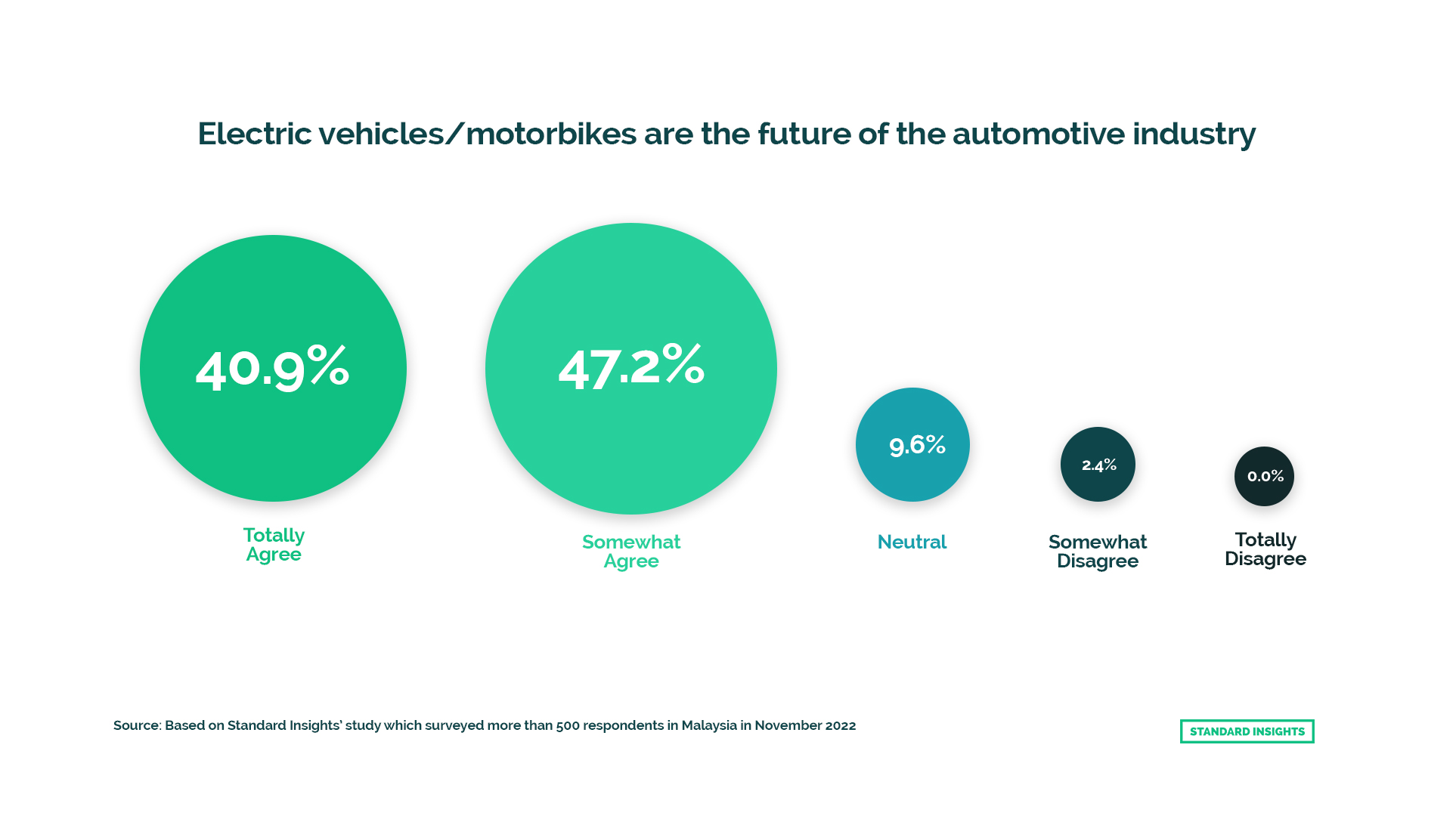
Moreover, demand for electric vehicles in Malaysia will grow immensely in 2023, driven by current incentives provided by the government and upcoming launches of more affordably priced EVs, according to Malaysian Automotive Association (MAA) President Aishah Ahmad.
Ahmad further emphasized that 2,093 EVs have already been registered as of October of last year, with Fitch Solutions projecting the figure to hit 4,449 units in 2023. They also believe that with the present tax breaks on fully knocked-down (CKD) and completely built-up (CBU) cars, the anticipated sales for 2023 can be met.
Key Takeaways
Although the traditional automotive industry is still the main form of transportation in Malaysia, things are slowly but surely changing as more Malaysians realize just how beneficial switching to electric vehicles can be. Electric vehicles have a range of advantages – such as reduced emissions and tax breaks – that make them a more attractive option. Recent advancements in battery technology have also made them considerably more efficient.
If the government continues providing sufficient subsidies, perceptions of electric vehicles in Malaysia will continue to change for the better. However, the country needs increased investment in infrastructure and charging options for this shift to take place on a larger scale.
All in all, it seems that by building upon existing strategies and investing in reliable charging infrastructure, Malaysia could pave the way for an automotive future reliant on electric vehicles.




